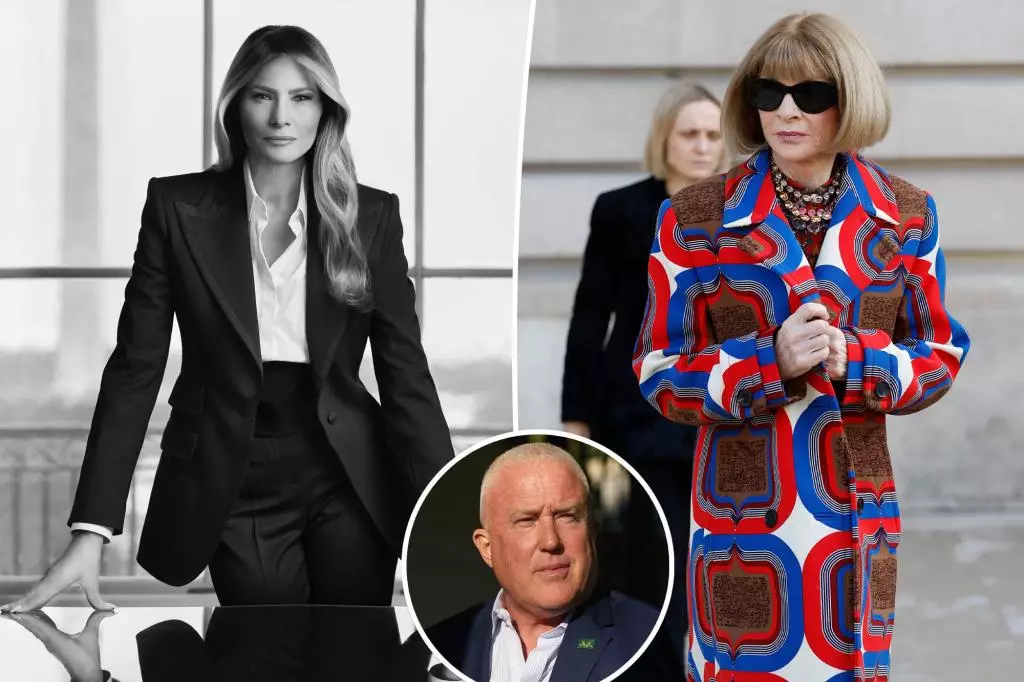The world of fashion is no stranger to controversy, but when politics influences public perception, the stakes are raised significantly. The recent backlash from friends of Melania Trump regarding Vogue’s harsh critique of her fashion sense brings forth a fascinating narrative. Friends of the former first lady have taken to the media to express their disdain for Vogue, labeling it “Condé Nasty,” an apparent jab at the publication’s parent company, Condé Nast. This discord not only reveals the complexities of fashion journalism but also underscores the intersections of celebrity, politics, and public opinion.
The op-ed in question was unforgiving, suggesting that Melania Trump’s presence in her official White House portrait was less than dignified. The commentary described her appearance as reminiscent of a reality television star rather than the distinguished role she held as First Lady. Such remarks can spark outrage, especially among her supporters. Bill White, a close friend of Melania and a political appointee under the Trump administration, publicly defended her, expressing admiration and urging others to cancel their Vogue subscriptions in protest. This response illustrates how deeply intertwined personal loyalty and political identity are, particularly in a polarized society.
Moreover, the language used in the Vogue piece—referring to Trump in terms like “freelance magician”—is emblematic of a wider trend within fashion media. Criticism can often be harsh and personal, especially in the highly scrutinized world of public figures. The fashion industry has the power to construct and dismantle identities, making its critiques particularly impactful. White’s defense emphasizes Trump’s “elegance” and “eloquence,” presenting her as far removed from the magazine’s disparaging portrayal, further complicating the narrative at hand.
Melania Trump’s own remarks about her reluctance to appear on the cover of Vogue add another layer to the story. During an interview, she underscored her belief that there are more significant matters to focus on than magazine covers. This statement can be interpreted in multiple ways; it may reflect a genuine indifference to fashion media or could serve as a strategic distancing from a domain that has caused her personal and political strife. Supporters and critics alike speculate about her relationship with the fashion world, often viewing her choices through the lens of their political affiliations.
An insider’s comment that “half the fashion designers won’t dress her” reveals a stark reality of Melania’s current standing in the fashion community. This illustrates the divide between political allegiance and personal branding in an industry notoriously fickle in its loyalties. For a former model and fashion icon, such a disconnect can be debilitating. However, some argue that she has long since moved beyond the need for external validation through fashion covers and designer endorsements.
The interplay between public opinion regarding Melania and the media’s portrayal of her is revealing. In a world where image is critical, the backlash from her supporters conveys a potent message of loyalty. It highlights a shared experience among those who feel the media has been excessively critical of political figures associated with the Trump legacy. Melania Trump has faced a broad spectrum of derision, and her supporters interpret this latest critique as part of a larger, ongoing campaign against her.
As the Vogue controversy unfolds, it poses interesting questions about the role of fashion in political landscapes. The revelation that the Mar-A-Lago elite favors the notion of second lady Usha Vance gracing the cover instead of Melania demonstrates fashion’s capability to reflect societal hierarchies. It also underscores a pivot in public admiration, suggesting a potential shift in popularity and influence within the Republican identity.
While Vogue has yet to publicly respond to the backlash, the incident underscores the volatile relationship between fashion media and politics. As society continues to evolve, the ways in which public figures navigate and interact with fashion will remain significant. Defending or denouncing a figure like Melania Trump speaks to deeper societal divides and allegiances, revealing that fashion is more than mere clothing—it is a battleground for cultural and political expression. The ongoing saga between Melania Trump, her allies, and the fashion industry demonstrates that in this world, perception is often reality, and resilience in the face of criticism can shape public narratives for years to come.

